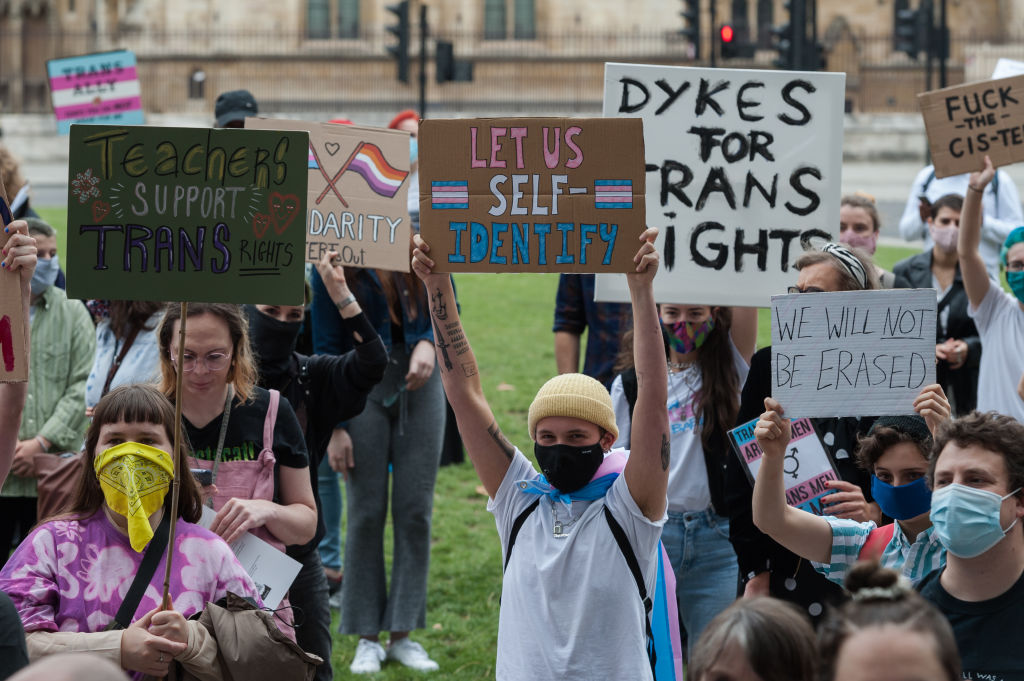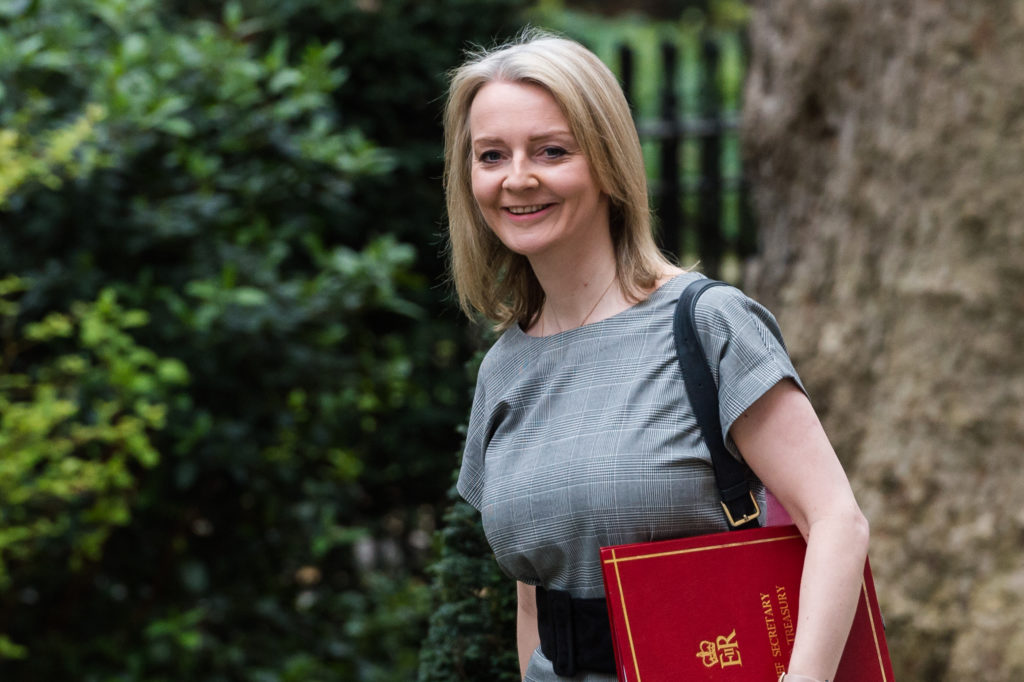Majority of women support trans people’s right to self-identify despite years of relentless transphobia, eye-opening polling finds

Transgender people and their supporters gather in Parliament Square to protest against potential changes to the Gender Recognition Act on 04 July, 2020 in London, England. (Wiktor Szymanowicz/Barcroft Media via Getty Images)
Despite years of negative news coverage relating to transgender rights and reformation of the Gender Recognition Act, a YouGov poll on behalf of PinkNews has found that most women are in favour of trans people self-identifying as a gender other than which they were assigned at birth.
This is despite the ferocious efforts of anti-trans activists and billionaire fiction writers trying to conflate the progress of trans rights with a threat to women’s rights.
A massive 57 per cent of women surveyed by YouGov for PinkNews agreed that trans people should be able to self-identify as their chosen gender, compared with 43 per cent of men from an overall sample of UK adults.
Only 21 per cent of women said they were against trans people self-identifying, compared with 33 per cent of men.
On the whole, 50 per cent of the UK population surveyed said they were in favour of trans people self-identifying, compared with just 27 per cent who said they opposed. Twenty-three per cent of respondents said they did not know how they felt about trans people being able to self-identify.
Read our open letter to Boris Johnson here.
"Transgender and non-binary people know that we are who we say we are," explained PinkNews' gender and identity reporter Vic Parsons.
"Public support for self-identification doesn’t change this – but it is still somewhat of a relief, given the horrifying levels of anti-trans rhetoric in the media, to see that a clear majority of the public back us continuing to self-identify as who we are without the need for medical evidence of our transness."
It's somewhat of a relief, given the horrifying levels of anti-trans rhetoric in the media, to see that a clear majority of the public back us continuing to self-identify as who we are.

Trans rights protest in London (WIktor Szymanowicz/NurPhoto via Getty)
The YouGov polling on behalf of PinkNews also found that self-ID of trans people is indeed a partisan issue, with those who voted Labour in the 2019 general election overwhelmingly in favour of self-identification, with 70 per cent in agreement compared with just 13 per cent opposed.
Labour MP Dawn Butler, the former shadow minister for women and equalities – who has clashed across the dispatch box with Liz Truss countless times, urging the minister to bring forward reforms to the GRA – urged the Tories and the equalities minister to pay close attention to the results of this eye-opening polling.
She said: "It's reassuring to find out that so many women believe the same as I do – that trans women are women, trans men are men, and that trans rights don't and shouldn't come at the expense of anyone else's rights. As the saying goes me having my rights doesn't stop you from having your rights.
I hope Liz Truss and the Tory government are paying close attention to the mood of the public before they announce their plans for the Gender Recognition Act next week.
"The fact that so many more women believe in trans people self-identifying as a gender different to that they were assigned at birth shows that often the transphobic rhetoric we constantly hear about trans people being a danger to single-sex spaces is only being spoken by a vocal minority.
"Preventing men from entering single-sex spaces, for example, is very different from trying to stop trans women. It's time to work together constructively to protect all women's rights.
"I hope Liz Truss and the Tory government are paying close attention to the mood of the public before they announce their plans for the Gender Recognition Act next week."
Inversely, 2019 Conservative voters are more likely to be opposed to self-ID, with only 35 per cent in favour compared to 42 per cent against. People who voted Liberal Democrat in 2019 were 63 per cent in favour compared to just 16 per cent opposed.
Baroness Lynne Featherstone, a former Liberal Democrat MP and equalities minister who served in the coalition government, said she was "delighted" by the results of the polling.
"But I'm not surprised that the vast majority of women support trans people's right to self-identify," she added. "They know as I know that trans women and trans men just want to live their lives in peace and that trans rights really means equal rights."
While welcoming the results of the eye-opening polling on behalf of PinkNews, Stonewall's head of trans inclusion, Kirrin Medcalf, made the salient point that there's still much more work that needs to be done.
"Over the past few years, there's been a disturbing increase in hate directed at trans people in the media, online and in day-to-day life; so it's good to see that the majority of British people continue to support trans people," they said.
"But this research also shows that we can't be complacent and more people's attitudes need to change before everyone is safe to be themselves. We need everyone who cares about equality to help make this happen by coming out in support of trans people and the wider LGBT+ community."
We need everyone who cares about equality to help make this happen by coming out in support of trans people and the wider LGBT+ community.
In Britain, the gruelling process by which a trans person gains legal recognition of their gender is governed by the Gender Recognition Act 2004, which requires a transgender person to self-identify and socially transition for a minimum period of two years, while also securing a diagnosis of gender dysphoria, before later applying for a Gender Recognition Certificate and having that outcome decided by a panel of people they have never met.
If the panel approves, the trans person can then apply for their birth certificate to be reissued with the correct gender marker.
Reforms to the Gender Recognition Act were first proposed by Theresa May’s government, with the former prime minister telling the PinkNews Awards 2017: "Trans people still face indignities and prejudice when they deserve understanding and respect.
"We’ve set out plans to reform the Gender Recognition Act, streamlining and de-medicalising the process for changing gender, because being trans is not an illness and it shouldn’t be treated as such."
What followed was the publication of the LGBT Action Plan, led by the government equalities office, which came after months of extensive research and cooperation from more than 108,000 LGBT+ people in the UK.
The LGBT Action Plan called for the gender recognition process to be "less bureaucratic and less intrusive".

Someone should probably show Liz Truss these polling results before she makes her Gender Recognition Act announcement. (Getty)
Results of a public consultation into the reform of the Gender Recognition Act have been kicked into the long grass for a number of years, but are finally due to be published by minister for women and equalities Liz Truss before the summer recess.
Journalist Eleanor Penny explained perfectly why "feminism without trans solidarity isn't worth the name".
"Transphobia corrals an ugly crowd of misogynist and homophobic stereotypes about what a real woman should be," she added, "whipping up paranoias about an already incredibly marginalised population and doubling down on age-old forms of sexism.
"Feminism means defending all women, not just the ones who fit a regressive, reactionary, static ideal of what womanhood looks like. So-called 'trans exclusionary radical feminists' are rolling back on the most basic principles of feminism – that biology shouldn't be destiny, that gender is a social construct, and that we are more than what we've got between our legs.
Feminism means defending all women, not just the ones who fit a regressive, reactionary, static ideal of what womanhood looks like.
"We don't need the poisoned solidarity of people who trot out the excuse they're 'defending women' when they're rightly called out on their bigotry."
While journalist Molly Fleming made the important point that this polling suggests the transphobic voices we hear in the media and online, whether it's Joanne or Karen, are simply part of an extremely vocal minority.
"These stats prove the reality, which is that it's a small group of cis women who don't support trans rights," she said. "Feminism and trans rights go hand in hand but we need to ensure that our support is not passive. We must fight for our trans siblings and ensure that their rights are not erased in the name of falsely protecting us."
Reassuringly, no matter which part of the United Kingdom you ask, you'll find that more people support trans people's right to self-identification than oppose, with London (59 per cent) and the rest of the South (47 per cent), the Midlands and Wales (47 per cent), the North (52 per cent), Scotland (50 per cent) and Northern Ireland (59 per cent) all in agreement that trans people should be able to self-identify.
Only 14 per cent of people in London were opposed, compared with 28 per cent in the rest of the South, 30 per cent in the Midlands and Wales, 27 per cent in the North, 31 per cent in Scotland and 26 per cent in Northern Ireland.

